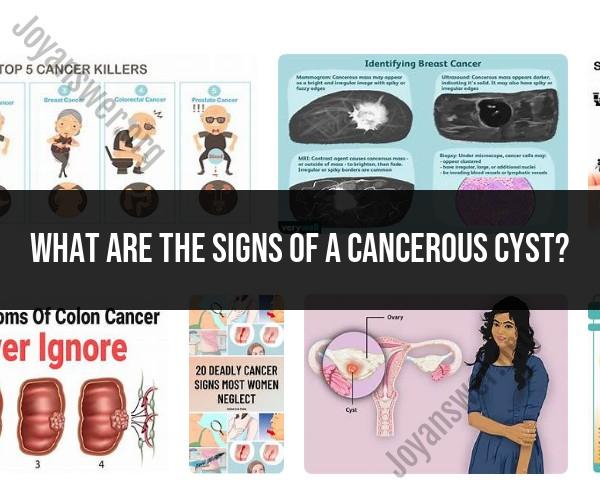What are the signs of a cancerous cyst?
A cyst is a sac-like structure that can develop in different parts of the body. Most cysts are non-cancerous (benign) and don't usually cause major health issues. However, in some cases, a cyst could be cancerous (malignant) or have the potential to become cancerous. Here are some signs that might suggest a cyst could be cancerous:
Rapid Growth: Cysts that grow quickly or change in size, shape, or appearance should be evaluated by a healthcare professional.
Persistent Pain: Cancerous cysts may cause persistent pain, discomfort, or pressure in the affected area. This pain may be different from the occasional discomfort associated with benign cysts.
Irregular Borders: Cancerous cysts might have irregular, jagged, or uneven borders when compared to benign cysts, which tend to have smoother edges.
Hardness: Cysts that feel hard to the touch or are not as movable as usual may raise concern.
Skin Changes: If a cyst leads to changes in the overlying skin, such as redness, inflammation, dimpling, or ulceration, it could be a sign of malignancy.
Fluid Discharge: If a cyst begins to discharge bloody or foul-smelling fluid, it should be evaluated by a healthcare professional.
Systemic Symptoms: General symptoms like unexplained weight loss, fatigue, fever, or other systemic symptoms that are not attributed to other causes might be concerning.
Family History: A family history of cancer or certain genetic syndromes could increase your risk of developing cancerous cysts.
Changes in Sensation: If a cyst causes changes in sensation, such as numbness, tingling, or shooting pain, it could indicate that the cyst is affecting nearby nerves, which might be a cause for concern.
Enlarged Lymph Nodes: Swollen or enlarged lymph nodes near the cyst could be a sign that the cyst is affecting nearby lymphatic drainage, potentially indicating a more serious issue.
Recurrence: If a cyst recurs after being removed, it might be a good idea to have it examined further. Recurrence could suggest that the cyst was not fully removed or that it has the potential to become cancerous.
Personal History of Cancer: If you have a history of cancer, your healthcare provider might recommend close monitoring of any new cysts to ensure they are not cancerous.
Remember that while these signs might raise concern, they are not definitive indicators of a cancerous cyst. Many cysts are benign and don't pose a threat to health. Only a qualified healthcare provider can accurately diagnose the nature of a cyst through proper medical evaluation and, if necessary, further tests.
If you have any doubts or concerns about a cyst, whether due to changes in its appearance, associated symptoms, or any other reason, it's always a good idea to consult a healthcare professional. Early detection and appropriate medical management are key to addressing potential health issues effectively.
Additionally, maintaining regular check-ups and open communication with your healthcare provider is essential for staying proactive about your health and catching any potential issues early.













